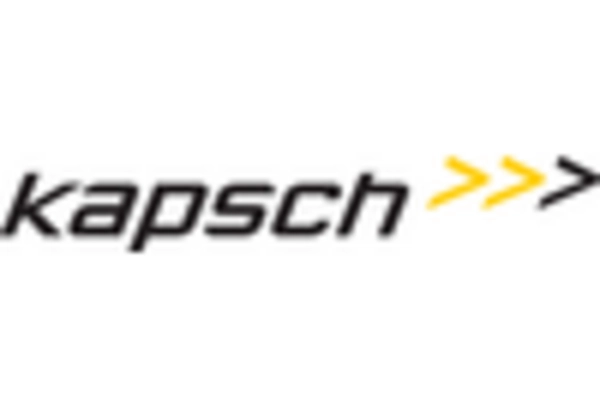Rising Urbanization
The increasing trend of urbanization in the United States is a pivotal driver for the intelligent traffic-management-system market. As more individuals migrate to urban areas, the demand for efficient traffic management solutions intensifies. Urban centers are experiencing congestion levels that can reach up to 30% during peak hours, necessitating advanced systems to optimize traffic flow. The intelligent traffic-management-system market is poised to benefit from this urban expansion, as municipalities seek to implement smart technologies to alleviate congestion and enhance mobility. Furthermore, the integration of real-time data analytics into traffic management systems can potentially reduce travel times by 20-25%, making these systems essential for modern urban infrastructure.
Public Safety Concerns
Public safety concerns are increasingly influencing the intelligent traffic-management-system market. With rising traffic-related fatalities, which have seen a 10% increase in recent years, there is a pressing need for systems that can enhance road safety. Intelligent traffic-management systems can incorporate features such as real-time incident detection and automated alerts, which can significantly reduce response times to accidents. The market is likely to expand as cities prioritize the implementation of technologies that not only improve traffic flow but also enhance safety for all road users. This focus on safety is expected to drive investments in intelligent traffic-management systems, as municipalities seek to create safer urban environments.
Environmental Regulations
Environmental regulations are becoming a significant driver for the intelligent traffic-management-system market. As cities strive to meet stringent air quality standards, there is a growing emphasis on reducing vehicle emissions and promoting sustainable transportation solutions. Intelligent traffic-management systems can contribute to these goals by optimizing traffic flow, thereby reducing idle times and emissions. The market is likely to see increased adoption of systems that support eco-friendly practices, as municipalities aim to comply with regulations and improve overall air quality. Furthermore, the potential for intelligent systems to facilitate the integration of electric and autonomous vehicles may further enhance their appeal in the context of environmental sustainability.
Technological Advancements
Technological advancements play a crucial role in shaping the intelligent traffic-management-system market. Innovations in sensor technology, data analytics, and communication systems are driving the development of more sophisticated traffic management solutions. For instance, the integration of Internet of Things (IoT) devices allows for real-time monitoring and management of traffic conditions, which can lead to a reduction in congestion by up to 30%. Moreover, advancements in artificial intelligence enable predictive analytics, allowing traffic systems to adapt dynamically to changing conditions. As these technologies continue to evolve, they are likely to enhance the capabilities of intelligent traffic-management systems, making them more effective and appealing to municipalities across the United States.
Government Initiatives and Funding
Government initiatives aimed at improving transportation infrastructure significantly influence the intelligent traffic-management-system market. Federal and state governments are increasingly allocating funds to enhance traffic management systems, with investments projected to exceed $10 billion by 2027. These initiatives often focus on deploying smart technologies that can improve traffic flow and safety. The intelligent traffic-management-system market stands to gain from these funding opportunities, as local agencies are encouraged to adopt innovative solutions. Additionally, the establishment of regulatory frameworks that promote the use of intelligent systems further supports market growth, as municipalities are incentivized to modernize their traffic management approaches.
















